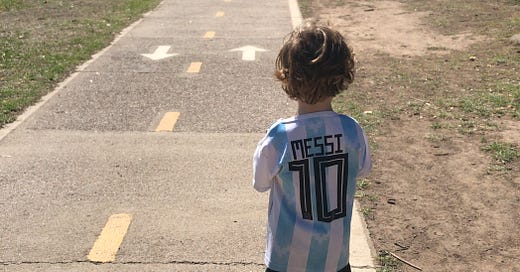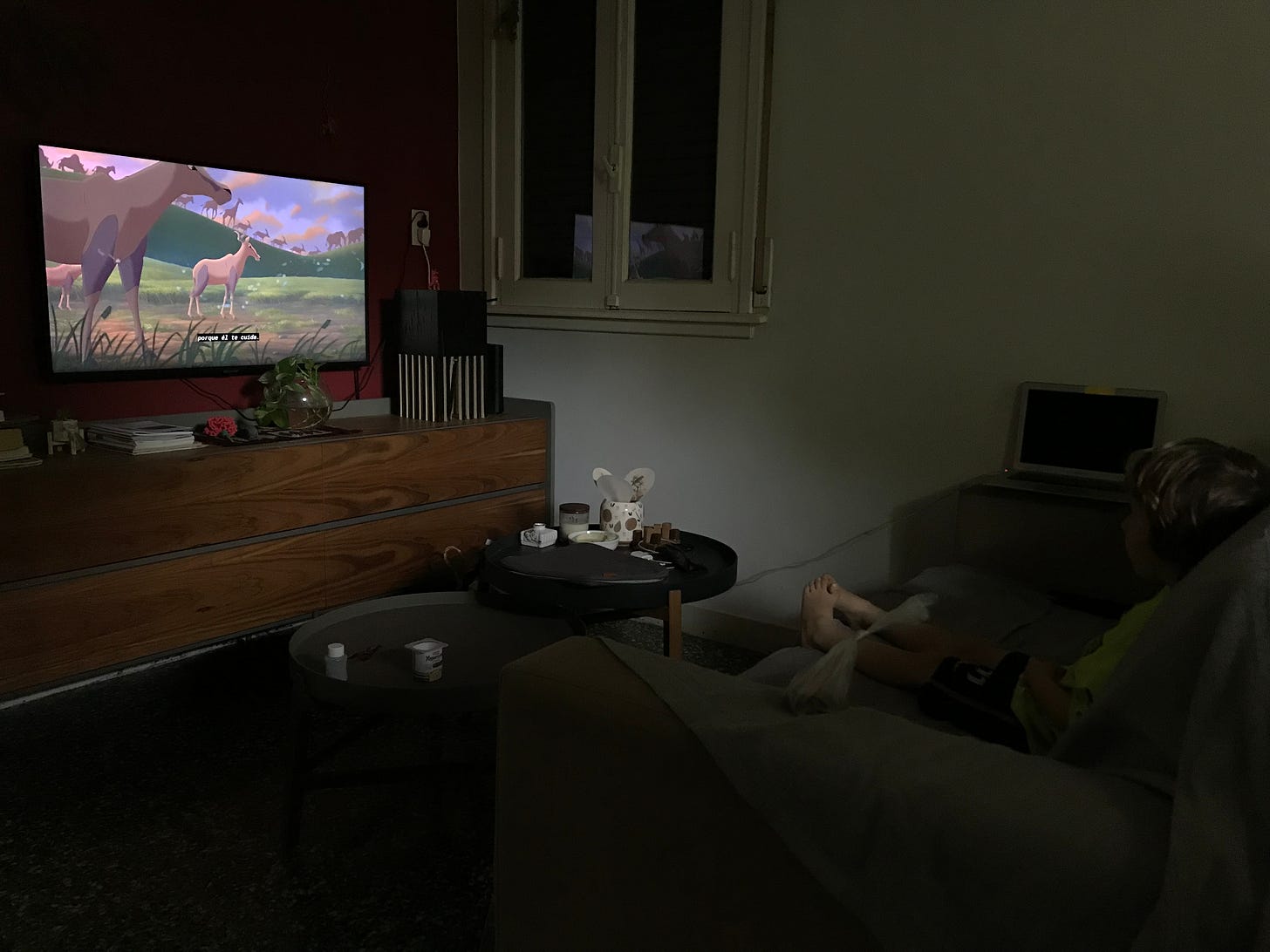Fragments of days
My family and I are in Argentina, where we haven't been back since before the pandemic. Some thoughts from across the ocean.
I am in Buenos Aires with my oldest son, Lorenzo, who recently turned four. Many people here are surprised that he almost always calls me by my name, “Nacho”, instead of “papá” - which he also calls me, but far less frequently. He also mostly calls his mother “Irene”, instead of “mamá”. Is this anyone else’s experience, for their children to call them by their names? Any theories about why? I'm all ears.
…
I’m writing this newsletter in fragments, like much of the conversations and thoughts I had in the days when I had one main role: parenting. My wife and our youngest are not joining us for the first part of our trip, so I am alone with Lorenzo in Buenos Aires. This means no time for any work other than being a father: and don’t get me wrong, I am not complaining. It’s just a description of the situation I am in, which is also my wish, and my duty.
It's raining outside as I write, so I have had to resort to the digital babysitter for the first time in ten days: Lorenzo is watching The Lion King. I couldn't find any other way to find some time, and get something down on paper.
It has me thinking about life, fragmented.
…
As I explained when I first started this newsletter, I stopped working for Lorenzo’s first two years, to look after him. My wife had started a full-time role, without taking a maternity leave — she needed to be away for hours, writing — and we decided this was the best way around it.
It kicked off a series of discoveries and internal thoughts about me which I am still wrestling with today. Like, what kind of a man am I if I am not working? I had been working since I was 17, and I didn’t stop for over two decades. And, can you end up being bored with a child?
My experience as a full-time dad pushed me to write a long piece which I never ended up publishing, but which some friends — mostly journalists and editors — read. There were lots of interesting suggestions and positive notes from them on how I could improve my writing on the topic, but one stands out: it was from a writer and a friend, who I respect a lot professionally — who told me that my text was very fragmented.
Maybe my friend was right. I hadn’t intended to write in a fragmented way, but I realized that effectively, that’s what I had done. I then asked another friend, a novelist with many books under her belt, what she thought.
She said: “Nacho, your story has some issues, but actually the fact it is fragmented is not one of them at all. The writing is about a father who is with his son. It’s written exactly as women have had to write, historically: as and when we can, and many times it will come out in fragments. Does your friend have kids? It doesn’t look like it judging by his comments.”
Her hunch was right — my friend didn’t have kids, nor was planning on them at the time, so it could have made a difference. I found it curious that even I hadn’t realized I’d been writing in patches. Looking back, I’d been typing up notes on my phone whenever Lorenzo was taking a siesta, or when I was waking at night to change his nappy, or trying to get him back to sleep again (I was also recording voice notes). The main source of my story was coming from snatches of audio and text I’d been saving.
My writing time was fragmented (as it is today), but so was my attention and capacity to think and elaborate on ideas: these spaces for reflection did not exist for me. My head works a bit like Twitter — a couple of lines and the hope that an idea will work, like a message in a bottle — that it’ll mean something more to whoever ends up reading it when it’s floated up in the sea.
…
There are so many positive, beautiful anecdotes I can share with you about having come home to Argentina. What is more lovely than seeing Lorenzo laughing out loud over and over again and having fun with his uncles and aunts, cousins and friends? We’re from a big family, and life without family and friends is a sacrifice when you choose to live in another country, a hole you can feel which is gaping, at least at the beginning.
“I want to stay in Argentina forever,” says Lorenzo. “Can we live here forever, and just go back to Greece for the holidays?” is another one of his variants on the topic. I am vague and short in my replies, because that is all that I can offer for now. It’s something that makes me happy and proud in some way but also poses more questions for our future.
One reason why Lorenzo wants to stay in his father’s native country is obvious: we’re surrounded by love and affection, but he is also not having to go to his kindergarten in Greece, and is mainly spending time with me (in Buenos Aires, life is going on as normal for our family and friends, people are working while we are on holiday, and the other children are going to school).
What’s clear is that this familiar pattern we have — of traveling, leaving routine behind — reminds me of something crucial: the lack of a support network beyond a kindergarten, a daycare, or an au pair.
Why is family equilibrium so fragile? Does it help us navigate the systems in which we live? In which being compensated in the labor market is one of our major priorities? And in which we gain legitimacy in some form or another?
We all need work, or look for work, although we only more or less need it. In part, it makes us visible, it validates us socially: “I am a journalist/ plumber/ accountant/ pilot/ architect, and I work here or there”.
The nuclear family, which is the prevailing model in our western world, is a very new invention, which has much to do with capitalism and the development of industrialized societies.
Historically, a large part of our lives as human beings were spent in community. When people started working and moving to urban centers, nuclear families started to become the norm — at least in the cities. Doesn’t it go without saying that it has made it more difficult to have a family life and children?
…
Jorge Barudy, a neuropsychiatrist and child psychiatrist from Chile (Villa Alemana, 1949), said: “Urbanization is centered in private interests and social isolation, is built from a financial perspective, so that children grow up in a mononuclear family unit and cannot enjoy other forms of social support.”
In an interview in Spanish with Pikara Magazine, he said:
“When the neighborhood existed, children were on the streets, helping each other, socializing with each other. Families could compensate for any incompetence they had, and each other’s deficits. The organized model of the market has made the neighborhood disappear, and the same thing goes for the extended family. Luckily, there are still some countries in the south of Europe where these kinds of communities exist, such as in Spain, for example”.
…
What space do mothers and fathers occupy? A few days ago, I was at a mixed group sports activity north of Buenos Aires where the average person was around 40. We had to go around and introduce ourselves. We spoke about how we came to this sport, and the large majority shared their professions. But no one of the 13 people mentioned that they had kids. Why is that? Because they certainly had them.
…
Lorenzo is finishing The Lion King 2 — it’s been too much screen time for today. And, it’s stopped raining — we have the entire afternoon ahead of us — and I think I have hit the limit for concentration. I hope some of these lines have meant something to you, the message in a bottle.
So, this week’s fragmented newsletter has come to an end.
Many thanks to all those who are following me, either by reading, commenting, sending emails or sharing this newsletter with others.
I’ll be back in your inboxes in two weeks, as usual.
I hope you are all well.
A hug from Argentina,
Nacho.
…
🙏 Many thanks to Worldcrunch for translating and editing this newsletter.






